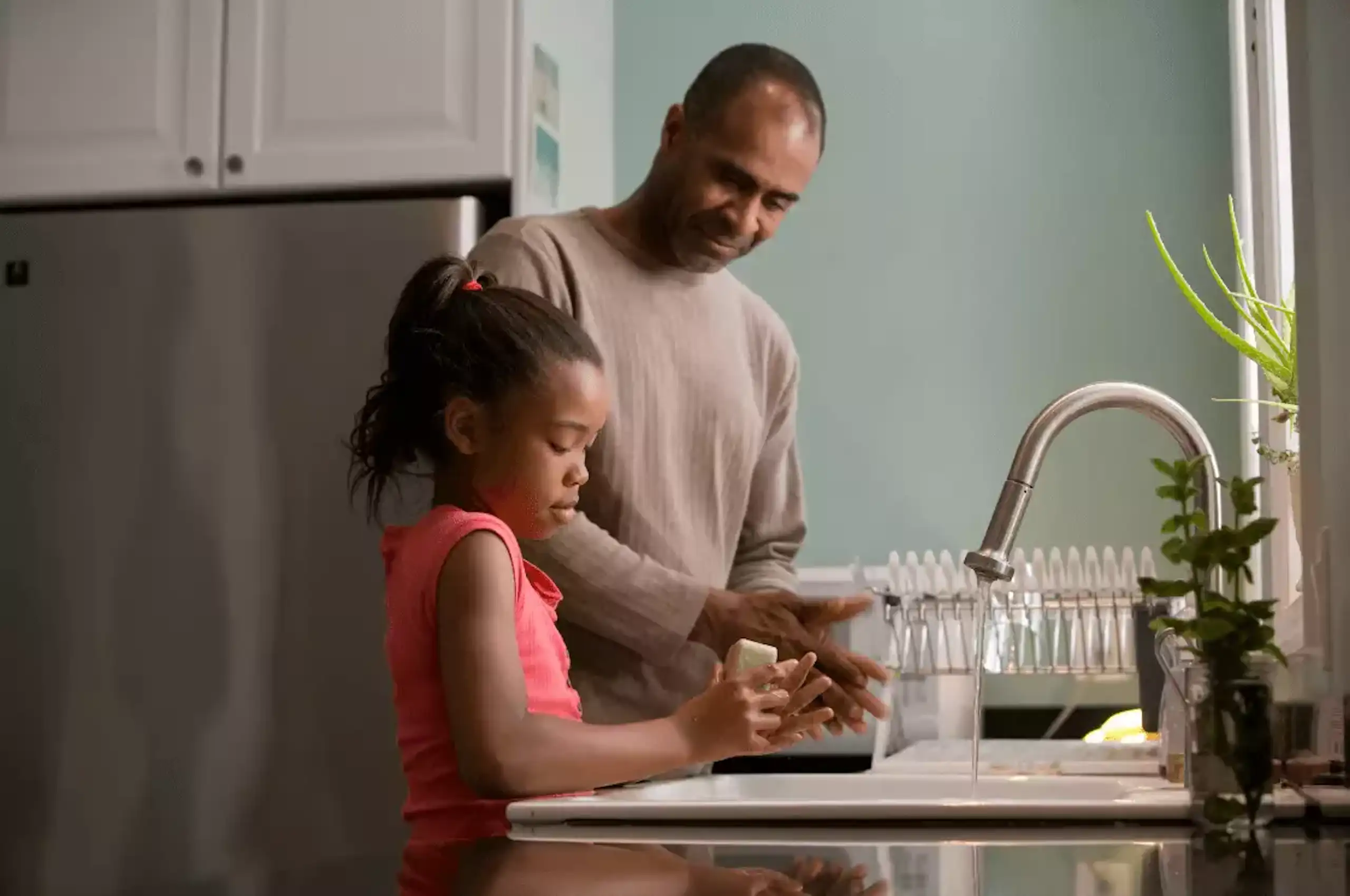Health & Wellbeing
How to talk to your children about mental health

Childhood and adolescence are critical periods that establishes the development of children in many aspects of life. How a child develops through these stages will determine how they grow and mature into adult life.
It isn’t uncommon for children to experience mental health challenges. In actuality, the Mental Health Foundation confirmed that 20% of adolescents experience a mental health problem in any given year. If you’re a parent, you may be wondering how you can provide a safe and comfortable environment for your children to freely express any mental health struggles they may be experiencing.
How can this be achieved? Through mental health awareness. By providing a safe environment to express one’s mental health, you can help facilitate the development of children and young people. It allows them to understand mental health, supports them in processing difficult emotions, and increases emotional awareness and resilience.
Why is it important to talk to your children about mental health?
Children and young people deserve a voice, especially when it comes to their mental wellbeing. Being comfortable with conversations around mental health encourages children to develop the ability to easily discuss their worries and gain better understanding of their mental wellbeing, which are extremely valuable skills.
The NHS recorded that 1 in 5 children and young people experienced a probable mental health disorder in 2023. However, the Mental Health Foundation found that 70% of children and young people do not have appropriate interventions at a sufficiently early age.
Children and young people deserve better, and parents should take pride in supporting their children in their mental health. It’s key in knowing your child has the awareness to feel comfortable and safe with their emotions and feelings. Here are some of the main reasons you should talk to young people about mental health:
1. It reduces stigma
Children are the next generation of adults, and their views will significantly impact the world – particularly when it comes to mental health stigma. It’s important that children have transparency and the correct information to fully understand mental health challenges. They should be clear in thinking that mental health is anything but shameful. By doing this, we provide significant steps to stamp out harmful stigmas for future generations.
2. It can improve emotional resilience
Supporting your child in feeling comfortable with their own mental health challenges allows them to be better able to deal with mental health challenges while they grow and when they are older.
3. It fosters better connection
Having open and honest conversations with your child is always beneficial for your connection. They feel as though they can speak to you about anything, which is especially important when it comes to mental wellbeing. It shows you are interested in their feelings and emotions, creating a stronger bond. They may feel more comfortable in approaching you about other challenges they have in their life.
4. It can boost confidence
Providing children with the opportunity to talk openly about their mental health allows your child to feel seen, heard, and understood.
It enhances their confidence and make them feel positive around their own emotions and feelings. By creating the safe space to talk about how they are feeling they are more able to understand those emotions and know how to deal with them, subsequently, increasing their self-confidence.
How to talk to your child about mental health
As parents there are ways to encourage your children to be open and honest about their mental health, but approaching your child can be a tricky and daunting task. Here are some simple ways to help you.
1. Read the room
You may observe when your child feels more comfortable talking, such as during playtime or after a long day out. It’s these times where it may be good to bring up the conversation.
If you notice your child is visibly upset, give them the space they need. After all, child or not, it can be hard to open up when you’re feeling distressed. Ensure you’re also in a good place to be able to talk about mental health too. This is so you can be in good shape to respond appropriately to their concerns.
2. Start positive
Starting a conversation about mental health isn’t always easy. Start off by letting your child know that you love them and support them, regardless of what they are going through.
Start the conversation when everyone is feeling good, such as after celebrating a successful school test. This way your conversation starts positively, it’s more likely to carry on positively, and shows to your child that mental health isn’t something they should be frightened of. Never start a conversation about mental health when emotions are running high.
3. Listen openly and actively
Feeling seen and heard is essential for anyone’s mental health and children are no different. Allow your child to speak freely and without interruption. In fact, it is a good strategy to listen more than you talk so that your child feels listened to. This way your child will feel they can get their emotions out without being judged or talked over.
4. Reassure them
Mental health is a complex topic and sometimes children may take it to heart if they are struggling because of stigma that is associated.
Reassure them that having challenges with mental health does not make them weak. In fact, dealing with and overcoming mental health challenges makes them strong. Most importantly, make it clear that it isn’t their fault.
5. Watch out for reactions
Be conscious about your initial reactions. You may be tempted to eyeroll or sigh, but these physical cues can have a huge impact on your child and how they next approach you when they need to talk.
6. Remind them you support them
Having tough conversations can become negative quickly, especially ones that evoke high emotions. Let them know you love them and can come to you with anything. It’s important to reassure your child and let them know you are on their side no matter what.
If your child is finding it hard to talk
It’s not uncommon for children to struggle with opening up about their feelings. Vocabulary may be limited, they may feel shy and confused. You may notice them shrug when you ask when if they’re okay, or they stay silent whilst they’re preoccupied with something else like playing or food. Here are some other ways to show up for your child when they’re struggling to express how they really feel.
Join in on their play time
For young children, it may be helpful to engage with their playtime. For example, you could voice the character of one of their favourite toys.
Engage in their communication style
Older children and teens may be more likely to engage in texting. Use emojis or gifs to check in with them. As a slightly different method of communication, it may help them open up into another way of showing they’re having a hard time. For example, they may use a sad face emoji.
Engage in something else with them
Simply being there is all that matters. Use this time to watch a film or cartoon together or ask them about a game they might be playing to show your interest.
If they’re still struggling...
if they struggle to express what they are feeling, young children may benefit from being given options such as "are you feeling angry/sad/confused/need some help?" to help them to identify and express what they are feeling. Give them reassurance by speaking their language and saying it’s okay to have "big, mixed up feelings", so they know it's okay to express that themselves.
If your child opens up about their struggles
This can feel distressing. After all, it’s hard to hear someone you love, particularly your child, is going through a hard time. It’s all too easy to express feelings such as upset or even anger, but it’s important to remember that they’re the ones hurting and need a non-judgemental space to open up. Offer to help them explore solutions, but if they’re showing resistance, it’s important to show you’re willing to simply listen.
You can even offer to do something else together to help take their mind off things should this suit the situation, or alternatively, offer to find support from more qualified places such as an assistance programme.
How our Employee Assistance Programme can help you
As parents, it’s important to look after your mental health too. HA | Wisdom Wellbeing’s Employee Assistance Programme (EAP), we can offer you practical advice and support when it comes to dealing with anxiety, and depression, and how to deal with emotions whilst supporting your child’s mental health. We can also support your employee's mental wellbeing with any problems they might be facing in their professional or personal lives with our 24/7 counselling helpline.
Conclusion
While it can be difficult to talk to children about mental health, it’s important for their development and building emotional intelligence and resilience. It can be distressing for adults and parents to hear about a child’s struggles, but it’s a great step to ensuring you can support them as best as possible or get them any professional help they need.

HA | Wisdom Wellbeing
HA | Wisdom Wellbeing is the UK and Ireland’s leading EAP provider. Specialising in topics such as mental health and wellbeing, they produce insightful articles on how employees can look after their mental health, as well as how employers and business owners can support their people and organisation. They also provide articles directly from their counsellors to offer expertise from a clinical perspective. HA | Wisdom Wellbeing also writes articles for students at college and university level, who may be interested in improving and maintaining their mental wellbeing.
Discover how an EAP can support your employees
With an Employee Assistance Programme (EAP) from HA | Wisdom Wellbeing, we can offer you practical advice and support when it comes to dealing with workplace stress and anxiety issues.
Our EAP service provides guidance and supports your employees with their mental health in the workplace and at home. We can help you create a safe, productive workspace that supports all.







